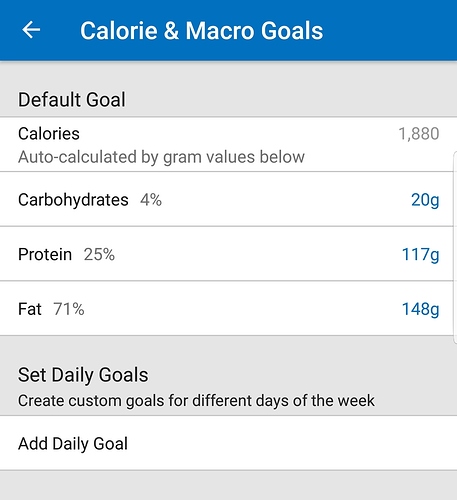Im Morbidly obese male according to my macros I ve to take around 148 fats daily.
So my question is being an obese I’m already carrying alot of fat so do I still need to eat alot of fats as required or I should try to make deficit in intake of fats
However today is my 5th day on keto and i ve already lost 2.3kgs kindly guide me further thanks
Morbidly obese and fat intake
You’ll need to eat a lot of fat until you’re fat adapted and then can reduce it if you want to, but you have to teach your body how to use fat as fuel in the first instance or it can’t tap into your stored body fat.
So how do I know I am totally fat adopted as already I’m not feeling hungry much
Yes, what Allie said!
I would just add that you shouldn’t feel that you have to force the fat. You’re training your body to use it as a fuel source, and that doesn’t necessarily mean a certain number of grams. I think the macro percentages can be misleading. The simplest (and most effective) guideline is:
carbs at or under 20 grams
protein scaled to your lean body mass
and the rest from fat (so eating fat to satiety)
Generally once you’re fat adapted and tapping into your own stores, you’ll need less fat to feel satiated.
So how do I know I am totally fat adopted as already I’m not feeling much hungry and I am too having sense of satiated
I’m still on 5th day
It’s probably early for fat-adaptation but I think for many of us it happens gradually (others have hunger and no energy and then suddenly feel different!). The usual guidelines are 4-6 weeks for fat adaptation. You’ll generally notice a different quality to your energy and a clarity to your thinking. I think there’s at least one long thread in here about that if you want to read others’ experiences.
In any case, don’t be afraid of fat but definitely don’t force it! If you’re satiated, you’re good.
[edited for typos]
Stay below your carbohydrate limit - stick with 20g per day to start but feel free to adjust when you are ready.
Aim for your protein target although this is pretty fuzzy and going high or low by a significant amount on a given day, say 50%, is no big deal.
Eat fat to satiety. There really is no target. Avoid snacking between meals. Feeling some periodic hunger is ok, perhaps desirable, so long as it is reasonable and goes away with a glass of water or other distraction. If your hunger seems excessive add more fats at your meals. If there is no hunger you can reduce fats at meals.
My experience was that my satiety signaling switched on first, then fat-adaptation happened later. Insulin drowns out the leptin signal generated by your adipose tissue that is supposed to signal the brain that we don’t need food for a while. Lowering carbohydrate intake allows this signal to be perceived by the brain again.
Fat adaptation takes around six to eight weeks, sometimes even longer, and it is a gradual thing and can be a bit hard to pin down. You will likely recognize it when you see it, however. People report a high level of energy, increased mental clarity, sometimes a feeling of being hot (as the metabolism increases and the body wastes a bit of energy), endurance athletes regain their performance and often exceed previous levels. Another feature of fat-adaptation is that the muscle cells start metabolizing fat itself, not just ketone bodies, which are the partial metabolites of fatty acids.
Apparently what happens is that the mitochondria in our cells get damaged from too much oxidative stress when we eat too much carbohydrate. When we reduce carbohydrate to the point where we start producing ketone bodies, the β-hydroxybutyrate turns off genes that prevent the body’s natural anti-oxidant mechanisms from functioning. But it takes the mitochondria some time to either heal or to produce more mitochondria, hence the need for an adaptation period. If you are measuring your ketones, you may notice a drop in the measured level once you are fat-adapted, because at that point the body is using the ketones it produces more efficiently.

